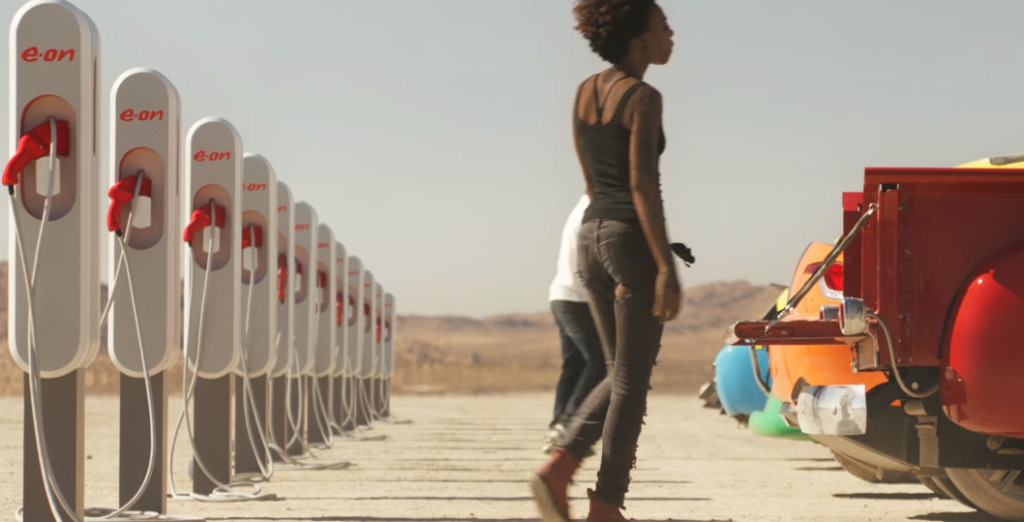E.On has launched a new campaign to promote its fledgling EV charging network as it prepares to bring E.On Drive to the UK.
Having established an active EV charging network in certain markets on the continent, E.On has now set its sights on the UK and intends to operate as many as 10,000 EV charging points in the country by 2020.
These will be made up of both rapid chargers installed at accessible sites throughout the UK, including local authority locations and small businesses, as well as residential chargers offered to its customers.
E.On began offering charging stations to local authorities and businesses last month. It forms one element of a multi-billion-pound investment from E.On in distributed power technologies that has so far incorporated solar-and-storage, smart appliances and intelligent homes.
And to launch the campaign E.On has commissioned a new advertisement featuring a raft of electric vehicles masquerading as V8, conventional engine-driven vehicles, with electric guitars used to mimic engine noise.
The company did something similar earlier this year to launch its domestic solar-plus-storage offering, collaborating with pop group Gorillaz for a TV advertisement and wider brand partnership.
Anthony Ainsworth, global head of marketing at E.On, said the campaign was about urging the public to “reconsider what they think they know about electric vehicles”.
Research conducted by the utility found that 70% of those it surveyed would not consider purchasing an electric vehicle, with 41% concerned that they would run out of power and 34% arguing that a lack of public charging bays would hold them back.
“Our aim is clear, to remove the perceived barriers of electric vehicles to really help improve the electric future for our customers. We are doing this by developing a growing network of charging points throughout Europe; whether at home, at work or on the go, from the city to the mountains. We are investing in superfast charging technology including the first superfast charging station in Germany, being installed later this year, meaning [EVs] becomes easy and drivers can get back on the road quicker than ever before,” Ainsworth said.
The launch of a dedicated EV charging network in the UK brings E.On into competition with the likes of fellow utilities Ecotricity and OVO, petrol giant Shell and EV specialist Chargemaster.
Last month Shell stoked controversy by announcing that its charging stations, dubbed Shell Recharge, would be priced at 49p/kWh from 1 July after a special, promotional price expired. Analysis by Clean Energy News found that this would render most EVs charging at those bays less economical than conventional engines.
E.On said it was too premature to confirm details surrounding its pricing regime for the charging network, but did confirm to Clean Energy News that it would be taking in learnings from how it operates networks already established in European markets like Denmark.
In Denmark, E.On Drive customers can subscribe to its service for a monthly fee, paying either DKK379 (~£45) or DKK579 (~£69) per month. Those fees, charged for EVs with battery sizes of <44kWh and >44kWh respectively, allow for unlimited access to publicly-available charging points and those installed at the homes of E.On customers.
E.On has already launched a special tariff for its customers who wish to charge their EV at home, centred around a special day-rate for 100% renewable electricity and a night rate that is 33% cheaper, designed specifically to incentivise charging when grid demand is at its lowest.





